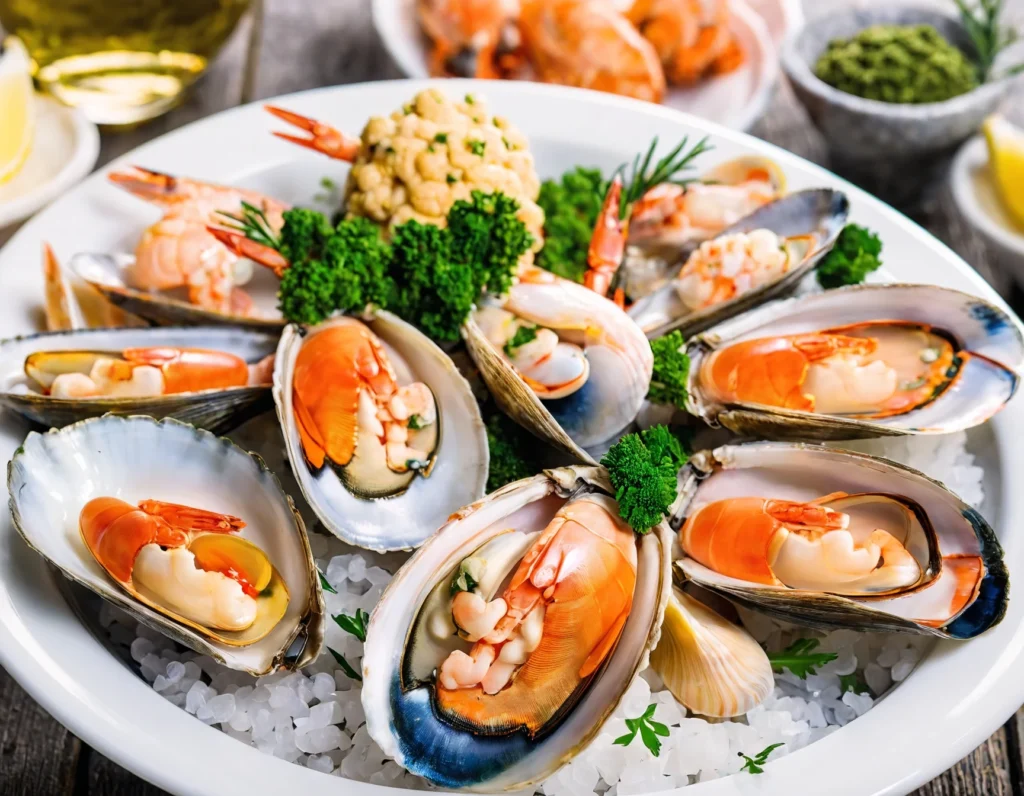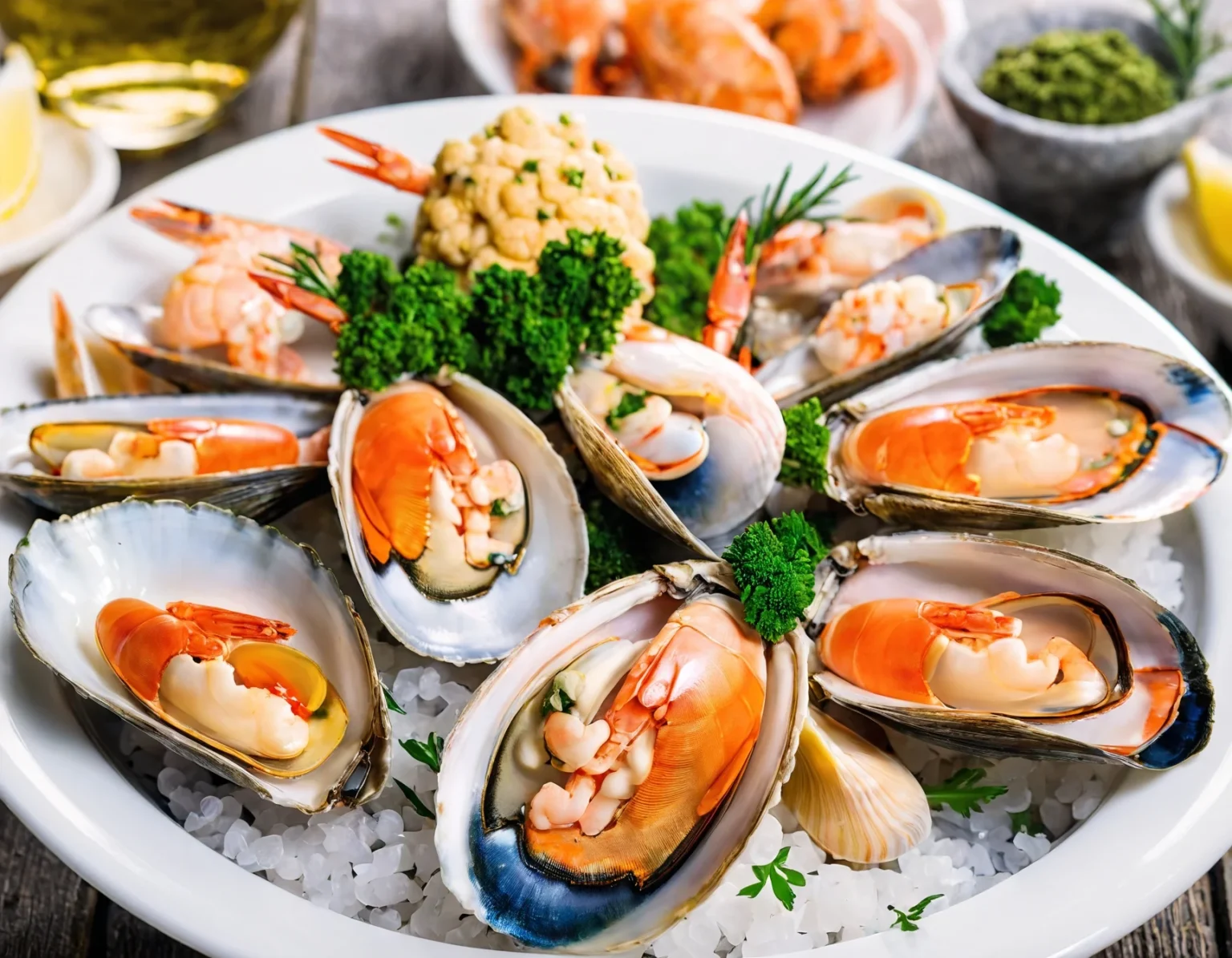Shellfish: A Nutritional Treasure
Key Takeaways
- Shellfish, including shrimp, crab, mussels, oysters, and clams, are nutrient-dense foods rich in protein, vitamins, and minerals.
- Regular consumption of shellfish can provide numerous health benefits, including improved heart health, enhanced brain function, and better immune support.
- Shellfish can be a versatile ingredient in various dishes, offering unique flavors and textures.
- It is essential to ensure that shellfish is sourced sustainably to protect marine ecosystems and ensure food safety.

Nutritional Profile of Shellfish
The Rich Nutrients of Shellfish
Shellfish encompasses a wide variety of marine creatures with shells, categorized into two main groups: crustaceans (like shrimp and crab) and mollusks (like clams and oysters). They are not only delicious but also incredibly nutritious.
- High-Quality Protein: Shellfish are an excellent source of lean protein, essential for muscle repair and growth.
- Vitamins and Minerals: Shellfish are packed with vitamins (especially B12) and minerals like zinc, iron, and selenium, which are crucial for various bodily functions.
Table 1: Nutritional Content of Common Shellfish Types (per 100g)
| Shellfish Type | Calories | Protein (g) | Omega-3 (g) | Vitamin B12 (% DV) | Zinc (% DV) |
|---|---|---|---|---|---|
| Shrimp | 99 | 24 | 0.3 | 51 | 24 |
| Crab | 97 | 20 | 0.5 | 50 | 25 |
| Mussels | 172 | 24 | 0.5 | 20 | 34 |
| Oysters | 68 | 7 | 0.1 | 133 | 90 |
| Clams | 148 | 26 | 0.3 | 1,000 | 58 |
Health Benefits of Consuming Shellfish
Cardiovascular Health
Consuming shellfish can significantly impact cardiovascular health. The omega-3 fatty acids found in shellfish can help lower triglyceride levels, reduce blood pressure, and improve overall heart function.
- Study Findings: Research published in the Journal of the American Heart Association shows that regular shellfish consumption is associated with a 20% lower risk of heart disease.
Brain Health
Shellfish, especially those rich in omega-3 fatty acids, contribute to improved cognitive function. Regular consumption may support memory and help prevent age-related cognitive decline.
Immune Support
Shellfish are a rich source of zinc, which plays a vital role in immune function. Adequate zinc intake helps the body fight off infections and supports wound healing.
Sustainable Sourcing of Shellfish
Importance of Sustainable Shellfish Choices
Overfishing and poor aquaculture practices can lead to environmental degradation and loss of marine biodiversity. Choosing sustainably sourced shellfish is essential for protecting these ecosystems.
- Sustainable Labels: Look for certifications from organizations like the Marine Stewardship Council (MSC) or the Aquaculture Stewardship Council (ASC).
List: Sustainable Shellfish Options
- Farmed oysters
- Farmed clams
- Maine lobster
- U.S. shrimp (wild-caught)
- Farmed mussels
Cooking and Preparation Methods
Techniques for Maximizing Flavor and Nutrition
Shellfish can be prepared in various ways, each enhancing its unique flavor and nutritional profile. Healthy cooking methods help retain the natural goodness of shellfish.
- Recommended Cooking Techniques:
- Steaming: Preserves moisture and nutrients without added fats.
- Grilling: Adds a delicious smoky flavor while keeping the shellfish tender.
- Baking: A versatile method that allows for various seasonings without excess oil.
Common Myths About Shellfish
Myth 1: Shellfish is Unsafe to Eat
While foodborne illnesses can occur, proper cooking and sourcing from reputable suppliers significantly reduce the risk. Cooking shellfish to the right temperature ensures safety.
Myth 2: All Shellfish is High in Cholesterol
Although shellfish contains cholesterol, it can be part of a healthy diet. Studies suggest that dietary cholesterol has a minimal impact on blood cholesterol levels for most individuals.
Conclusion
Shellfish is a versatile and nutritious food that offers numerous health benefits, including support for heart health, cognitive function, and immune support. By making sustainable choices and using healthy cooking methods, individuals can enjoy the delightful flavors of shellfish while contributing to the health of marine ecosystems.
FAQ
1. How often should I eat shellfish?
It is recommended to consume shellfish once or twice a week to reap its health benefits.
2. What are the best types of shellfish for heart health?
Fatty shellfish like crab and shrimp are great options for heart health due to their omega-3 content.
3. Is shellfish safe for pregnant women?
Yes, but pregnant women should avoid raw or undercooked shellfish and ensure it is sourced from safe, reputable suppliers.
4. How can I tell if shellfish is fresh?
Fresh shellfish should have a mild ocean scent, tightly closed shells (for live shellfish), and firm flesh. Avoid shellfish that have an off smell or open shells.
5. Can shellfish be part of a weight-loss diet?
Absolutely! Shellfish is low in calories and high in protein, making it an excellent choice for weight management.











